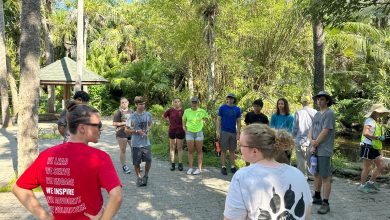The gravity of being a woman in STEM
Alumna Laura Forczyk started her career in STEM at Florida Tech where she earned her astronomy/astrophysics degree in 2006. Since then, Laura has experienced not one, but two zero G parabolic flights while pursuing her Ph.D. at UCF. She is now the Manager of Florida Operations for Swiss Space Systems (S3 USA) where she is leading the charge on bringing zero G flights right to Florida Tech’s backyard—the Kennedy Space Center.
What inspired you to pursue a STEM education and career?
When I was in third grade, I wrote a story about being an astronaut on the Moon. Space captivated me. My parents nurtured my interest by sending me to Space Camp in Huntsville, Alabama four times in middle and high school. (I later went twice more as part of a NASA internship!) I job shadowed a group of scientists and engineers at NASA Goddard Space Flight Center in high school. By the time it came to applying to colleges, I knew that I wanted to pursue a space career. Applying to college at Florida Tech, so close to Kennedy Space Center and with such great technical programs, and majoring in astronomy/astrophysics was an easy decision for me.
What do think are some of the most shared/common challenges women in STEM fields encounter?
Underrepresentation is a major concern. At times I’m one of the only women in a room full of men or I’m watching an all-male panel of experts. My astronomy classes were surprisingly close to an equal split. But in my career in the space industry, women typically make up 10 – 30% of any grouping (I make a point to count each time) and those figures shrink when looking at upper management. The underrepresentation of women in STEM professions leads to many problems such as the sexual discrimination issues that have been in the news lately.
How have you overcome obstacles/challenges as a woman in STEM?
I don’t let others dissuade me from pursuing my passions. I’ve learned to be bold and stand up for myself. I’m not afraid to be the girly-girl in a dress (and currently third trimester pregnant) speaking my mind openly in a group. I’ve experienced low-level sexual harassment and discrimination, but I haven’t let it hinder what I set out to do. I take note of my female colleagues and back them up when I witness them being held back. Some women feel the need to cut other women down to prove their dominance and gain attention, but I take the opposite approach. We’re all in this together.
Knowing what you know now, what advice you would give your younger self?
I would assure my younger self that it’s okay to take a risk and try a different path! I felt strong pressure early in my career to conform to what was expected of me, but it’s those who stand out and dare to be true to themselves who really succeed. There’s a huge world out there full of a variety of opportunities. I shouldn’t have ever felt the need to ask anyone’s permission to pursue my passions, as different as they were.
What one takeaway would you want to impart on a young woman thinking of pursuing an education/career in STEM?
If you have any interest, try it! It’s okay to change your mind later if it’s not for you, but chances are, it is. Why let anyone stop you from being who you are?
What is an aspect of being a woman in STEM you were surprised to discover?
Without making a positive or negative judgment, women are noticed and remembered. As a younger woman, I didn’t realize how much people were observing and taking note of me. I wish that I had taken advantage of this by networking and following up more.
In your experience, what are the top things leaders could do to encourage more young women to enter STEM fields?
Implement protections and protocols for department or university faculty/student interactions and allow anonymous reporting directly to an authority who will take action to protect female students from inappropriate or unwanted attention or discrimination. Consider more female candidates for positions, honors, awards, and leadership roles, and include more women in selection committees. Encourage female students to ask questions during presentations, take on leadership roles in student groups or projects, or try something outside of their comfort zone.
You can follow Laura on her blog, laurasspaceonspace.blogspot.com, where she shares her passion for space and STEM outreach.





